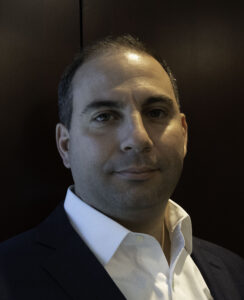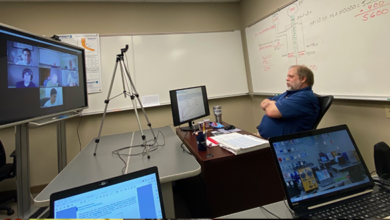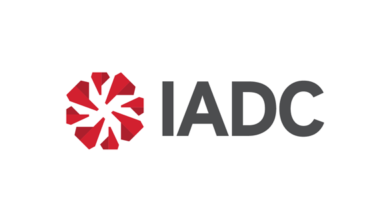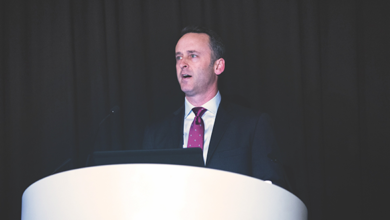Brian Piccolo, AFGlobal: Vision for safer, more autonomous drilling guides his work as Chairman of IADC UBO/MPD Committee
By Jay Stracke, Editorial Assistant
What defines the mind of an engineer? Is it curiosity? Is it the desire to understand the world around them? Is it the motivation to constantly improve?
For Brian Piccolo, Technical Sales Director of Advanced Drilling Systems at AFGlobal, it was all three. As a kid growing up in Boston, he took apart everything he could find in his house, trying to figure out how it worked. He pursued an education that fostered his innate curiosity, graduating from Penn State University with a Bachelor of Science in industrial engineering.
After that, Mr Piccolo accepted a position focused on operations research and budget management for Intel, where he was primarily responsible for the development of statistical models for the company’s fabrication facility and supported the implementation of lean manufacturing.
“I learned that I would be spending a lot more time relying on my soft skills as opposed to the engineering skills I actually learned in school,” Mr Piccolo said. “Looking back, I was probably an early form of a data scientist with less sophisticated tools than what are available today.”

But during his two years with Intel, Mr Piccolo developed a burgeoning interest in the oil and gas industry. In the late 2000s, he enrolled in a reservoir engineering and a drilling engineering course online through Texas A&M University. During the drilling engineering course, he recalls the first time he learned about the first of stage of the driller’s method – a process in which the well is closed in and a choke is used to control wellbore pressure during a well control event.
“I wondered why we didn’t always drill this way,” Mr Piccolo said, noting the high level of control that this method of wellbore pressure control provided. “We should always be sealed in on the drill pipe. We should always be circulating through a choke. But after doing a little bit of research online to explore further, I realized that this type of drilling did exist. It was called managed pressure drilling (MPD).”
MPD creates a closed system that helps users quickly respond to uncertain wellbore conditions and successfully drill through narrow-margin hole sections. Utilizing this methodology, proponents of MPD argue, can help companies better mitigate against various hazards and enhance the probability of project success.
As soon as he learned of this method, Mr Piccolo knew where his future lay. “I was going to figure out the most efficient path into the industry,” he said, which turned out to be pursuing a master’s degree that would allow him to focus on drilling engineering and MPD. To that end, he enrolled at Louisiana State University (LSU) to attain his Masters of Science in petroleum engineering.
While attending LSU, Mr Piccolo maintained a research focus on MPD and well control, specifically surrounding the detection and diagnosis of complications that may occur during the circulation of an influx with the MPD system. Under the guidance of associate professor Dr John Rogers Smith and with the support of the LSU faculty and staff, Mr Piccolo was able to deliver a thesis and have the opportunity to practice circulating out influxes from a full-scale wellbore at the LSU PERTT facility.
In 2016, Mr Piccolo joined AFGlobal as Technology Development Manager for Advanced Drilling Systems, where he was responsible for the development of land and offshore MPD systems. In his current position as Technical Sales Director of Advanced Drilling Systems, Mr Piccolo said he continuously works to help the industry understand and implement MPD solutions, where there remains significant untapped potential.
“Looking forward, an autonomous MPD system can have the ability to respond to unforeseen wellbore conditions faster than a human being could, resulting in improved safety,” Mr Piccolo said. “A significant step towards enabling autonomy requires the integration of the MPD system with other control systems on the rig so that the MPD system can make decisions based on a proper assessment of its environment.”
Guided by a vision for a safer, more autonomous industry, Mr Piccolo currently serves as Chairman of the IADC UBO/MPD Committee, a group focused on drafting and updating MPD standards, many of which have been adopted by API, and planning an annual conference. As chairman of the committee, he said he will seek to further its mission, which is to promote the safe and efficient execution of underbalanced operations and MPD worldwide.
“Everyone in this committee really believes, at a personal level, that MPD is safer and the best way forward for the industry,” Mr Piccolo said. “And at the end of the day, I’m a father of two children. If I’m not producing something that makes the world a safer place, and in that regard a better place, then what values am I effectively teaching my own kids for when they become adults, engineers, or whatever it is they decide to pursue?” DC




